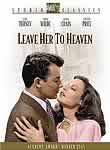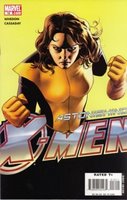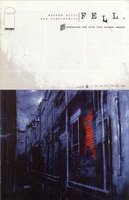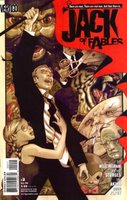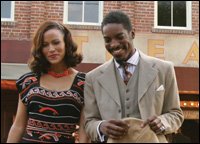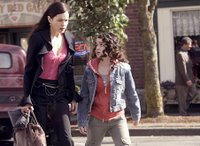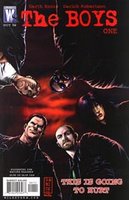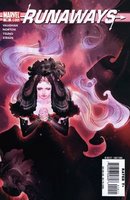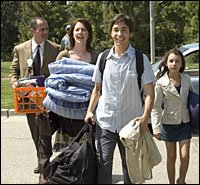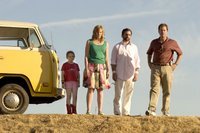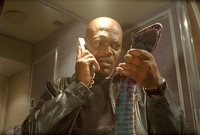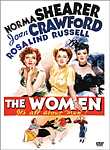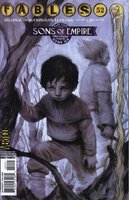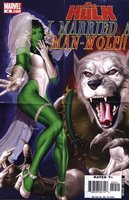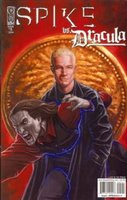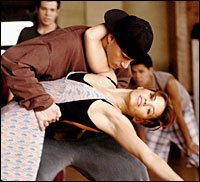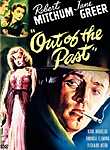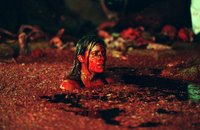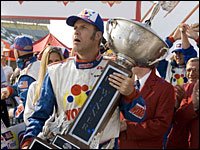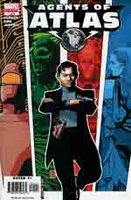 Agents of Atlas #1 (Jeff Parker/Leonard Kirk, Marvel)
Agents of Atlas #1 (Jeff Parker/Leonard Kirk, Marvel)I'm completely unfamiliar with the Golden Age Marvel characters being revived for this series, and I've never read anything Parker's done before, but I like the idea of exploring forgotten corners of Marvel continuity, and I like Leonard Kirk's art, which I haven't really seen while he's been busy on DC titles I don't read, so I was happy to give this a shot and I'm glad I did. It's nothing earth-shattering, but it's a fun superhero story with good use of continuity, from the old characters to elements of the short-lived
Nick Fury's Howling Commandos series. There's a cliffhanger that makes me wonder what happens next, and that's enough to get me back for the next issue.
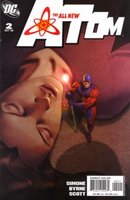 The All New Atom #2 (Gail Simone/John Byrne, DC)
The All New Atom #2 (Gail Simone/John Byrne, DC)Speaking of nothing earth-shattering, here's another solid, fun superhero story from Simone and Byrne. Grant Morrison's name is already out of the credits box, so the weird ideas are toned down a bit, and honestly I'm more interested in the main character and his supporting cast than in the bug-like villains who mangle verb tenses. I was pleasantly surprised with the first issue, but this one is a little more conventional and less surprising, but still enjoyable and worth continuing to give a shot. It's just nice to read DC books that are self-contained and not full of impenetrable continuity, really.
 Ex Machina #22 (Brian K. Vaughan/Tony Harris, DC/Wildstorm)
Ex Machina #22 (Brian K. Vaughan/Tony Harris, DC/Wildstorm)Harris breaks out a very different
art style this issue, which is sort of an odd move in the middle of an arc, I think. Not that I don't like it - it makes the art look softer and more painterly, which is cool, although I might say right now that I preferred the more defined lines of Harris' older style. Still, always nice to see an artist pushing himself to try new things and improve. Story-wise, this issue continues to connect the dots among the various plot elements, and ends with another figurative (as well as literal) gutshot. As I said before, one of the book's most intriguing arcs yet.
 The Exterminators #8 (Simon Oliver/Chris Samnee, DC/Vertigo)
The Exterminators #8 (Simon Oliver/Chris Samnee, DC/Vertigo)This issue is titled "Interlude," and once again I'm struck by how much better this book is as a character drama than as a sci-fi piece about mutant bugs. There isn't a single bug in this entire issue, but it's a great exploration of the two women in Henry's life, fleshing out both Laura and Page and showing their interesting parallels and differences. It's also got a bit of development for Henry, who's been something of a cipher despite being the lead character. I'm disappointed in the title, because it implies that we'll be back to the bug stuff next issue, and I'd really love to see Oliver continuing with the character stuff and letting the bugs recede into the background.
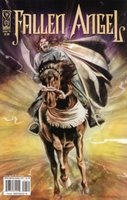 Fallen Angel #7 (Peter David/J.K. Woodward, IDW)
Fallen Angel #7 (Peter David/J.K. Woodward, IDW)The conclusion of the story of what happened to Lee right after she fell, and a continuing treatise on David's ideas about the insanity of God. Some brutal stuff, and interesting, but I miss Bete Noire and the more character-based stories. Telling the Angel's origin has given David plenty of chances to explore theology, which is cool, but I hope this little detour is over for now and we get back to the familiar supporting cast and some new antagonists for Lee.
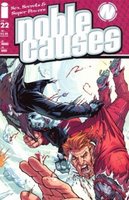 Noble Causes #22 (Jay Faerber/Jon Bosco, Image)
Noble Causes #22 (Jay Faerber/Jon Bosco, Image)Thankfully, the lesbians return in this issue, which proves that Faerber doesn't forget his subplots, just lets them simmer for months at a time. This issue focuses mostly on Zephyr and Rusty confronting Frost about his shady activities, which is one of the less compelling plot elements that's been pending for a while. I remain baffled by all the weird misogynistic subtext to the whole "Rae is a robot so we literally took her apart" plot, which Faerber is either unaware of or patiently waiting to bring to the forefront. I suspect it's the former, which makes me uneasy with the whole storyline. But, hey, lesbians, so I can't complain too much.
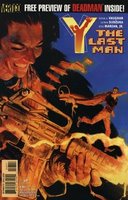 Y the Last Man #48 (Brian K. Vaughan/Goran Sudzuka, DC/Vertigo)
Y the Last Man #48 (Brian K. Vaughan/Goran Sudzuka, DC/Vertigo)For the most part, this is yet another origin flashback, this time for Alter, the hard-nosed Israeli soldier who's only appeared in a handful of issues. Once again, it's somewhat engaging but not that essential, but at least it's framed by some interesting developments in the present-day plot. Vaughan shows another surprising yet completely logical aspect of the world he's created, as the revelation of Yorick's existence has sparked brutal fighting between various factions, all of whom wish to control him. I hadn't really considered the possibility before, but given where things seem to be headed and the limited number of issues left until the finale, it wouldn't surprise me now if the book ended with the last man dying off and leaving the world to the women.
 I've been really disappointed in Fox's entire slate of new shows; it's the only major network that doesn't have a single new offering that I plan to watch beyond the first episode. This show is maybe not as bad as last week's Vanished, but it's not any good, either, and it's so obviously the product of the Jerry Bruckheimer factory plugging one new element (a high-profile L.A. law firm) into their existing (and very successful) procedural format. Since it's on Fox, everything has been amped up annoyingly, and while I can usually tolerate something like CSI or Without a Trace even if I don't exactly like it, this show just gave me a headache, with all the characters constantly yelling and the breakneck pace and the busy camera work and Victor Garber, who was so great on Alias, delivering every line with as much smarm as possible.
I've been really disappointed in Fox's entire slate of new shows; it's the only major network that doesn't have a single new offering that I plan to watch beyond the first episode. This show is maybe not as bad as last week's Vanished, but it's not any good, either, and it's so obviously the product of the Jerry Bruckheimer factory plugging one new element (a high-profile L.A. law firm) into their existing (and very successful) procedural format. Since it's on Fox, everything has been amped up annoyingly, and while I can usually tolerate something like CSI or Without a Trace even if I don't exactly like it, this show just gave me a headache, with all the characters constantly yelling and the breakneck pace and the busy camera work and Victor Garber, who was so great on Alias, delivering every line with as much smarm as possible.
